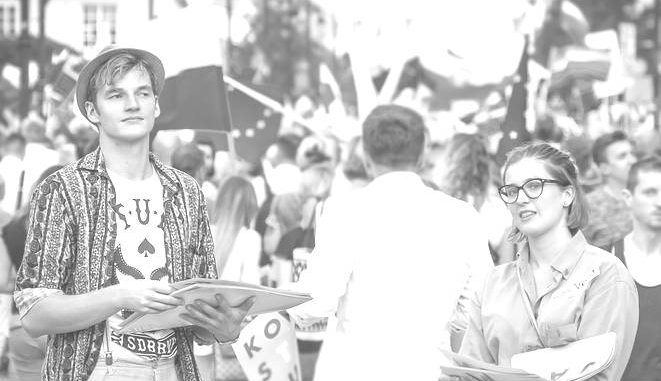
The day after the incredible events of the Catalan referendum, and the day before a general strike that has been called to challenge the Spanish state’s violence, Mireia Vehí, Member of the Catalan Parliament, for the political party CUP, explained the strategy of the left independence movement to David Whyte.
David Whyte is Professor of Socio-legal Studies at The University of Liverpool
Why is independence an important strategy for the left in Catalonia?
When we decided to stand candidates for the Catalonian parliament from our position as a popular movement, it was because we understood the movement for independence as an opportunity to change a lot of things and to smash the Spanish regime and begin a process of social change. We are not just interested in changing the flag or changing the name of the country. We are anti-capitalist, feminist and socialist, so we are going to try to build a republic in this sense. Last year, we put the referendum at the centre of the political process, and in exchange we agreed to vote to pass the Catalonian budget. It was our demand that led to yesterday’s referendum.
Obviously the left is split on the question of independence. What do you think the referendum means for the left political parties?
It is such a contradictory situation, because there are now different parties occupying a common space. We have the left coalition in Barcelona (Barcelona en Comu) and we have other different left coalitions in different town councils. And then in Madrid they take another form: Podermos. The people from Madrid involved in Podermos of course have a different reading of the situation. They read what happened yesterday as a revolt against the PP (the ruling party) and they see the aim as changing the Spanish government. Some people are declaring against the referendum because it breaks the regime. Ada Colau (the leader of Barcelona en Comu) is not against the referendum, but en Comu are closely linked to the movement in Madrid and they have not made a clear statement to support the Catalan republic. But it is complicated, because many of them do want to break the regime and support the republic. But now this range of voices across the left are going to have to choose: should the referendum be used to focus on a change of government, or to create a new republic in Catalonia? For us this is the most important moment for 40 years. Obviously we want the left to unite behind the aim of smashing the regime.
How important is local organisation in the neighbourhoods in keeping the momentum for real social change?
We have a much bigger job to do now. We need to maintain the popular power that we saw on the street and we have to build a workers’ popular republic that challenges our own power structure: the banking sector, business and wealthy elites, supported by conservative parties. We therefore need to strengthen this constituent process. We have been working for many years now with strong roots in the communities. This is where our politics comes from and are still rooted. We have had a lot of people working as part of the current process for at least 6 years. What we saw yesterday is that the people on the streets were stopping the repression and Fascism of the Spanish state on a huge scale. This is only explained by two things: first the collective work that we have been doing in the communities, using a very high level of participation in decisions and developing strategies for social change, and second because people in Catalonia hate Fascism. We lost the war against Fascism in ‘39, and we then suffered under Franco for 40 years. Yesterday the people recognised the Guardia Civil and the Spanish national police as exactly the same police as the regime of ‘39.
How will municipal socialism and the movement for radical social change in Catalonia be strengthened by the referendum?
This is all we have: the radical left only has the people. We don’t have power anywhere else. We don’t have a lot of money and we don’t have the networks in political structures or the legal system or the police. Our power comes directly from our own people. We have a small number of municipal governments and we have 10 MPs. It is not exactly the classic model of parliamentary and political power. The only thing we’ve got is popular power. If we are able to maintain this in the coming months, we are going to win. If not, then we are going to lose. And we have a lot to lose. What we can win is exactly the same as what can lose. We can win a republic, a new workers’ republic, and we can win a new constitution, a new legal order. But if we lose, we lose the sovereign power that the Catalonian political system has and we might lose a lot of people because the Spanish state is going to intensify the repression, and we might even see a lot of people imprisoned, and a lot more that are prevented from making politics. So we need to sustain the mobilisation to win a new republic that is worth winning. This is the key to this process: popular power.


Be the first to comment